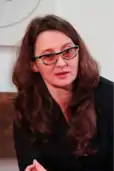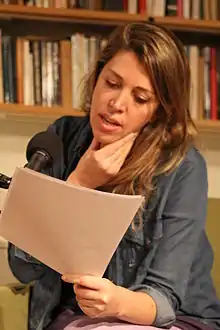Argentine LGBT+ cinema
Argentina has a strong body of national LGBT+ cinema. It is also home to the international LGBT film festival Libercine.[1] Some LGBT+ films from the country have been said to "have created an impact thanks to positive critical reception, and their queer protagonists",[2] with the nation itself in recent years said to have "taken the lead in Latin America in producing provocative films that shed the cliches of so much commercial gay filmmaking in the United States".[3] Deborah Shaw theorises that new forms of co-production and different avenues of funding may be promoting more queer film in Argentina.[2]
| Latin American LGBT cinema |
|---|
 |
|
Analysis
Homosexuality as social commentary
Rosalind Galt proposes that though new queer Argentine cinema and New Argentine Cinema (NAC) occupy the same time period, they may be distinct; that queer cinema is excluded from the discussion of NAC and "crisis cinema". Galt argues that "queer textuality provides a radical mode of articulating economic refusal", that the extra queer narrative is further subversive against crisis in ways not occupied by NAC, precipitated by creative and cultural differences between queer cinema and other modes of filmmaking.[4]
In his 2016 article, Guillermo Abel Severiche also positions queer Argentine cinema as "[conceptualizing] desire as a means to defy a discourse of power", referring to Plan B when he asserts that "the construction of a (homo)erotic sexual tension questions the validity of sexual categories and/or their very existence", breaking a fixed cultural construct.[5] One way in which this is achieved is the presentation of how the protagonists discover their sexuality, without self-imposing heterosexuality onto themselves or each other.[5]
The idea of critiquing society by empowering characters through queer narratives had been mentioned by Lucía Brackes of Los Andes in 2012, in discussion of the much older 1969 Fuego. Brackes reflects that "Coca is such a whore that she becomes a lesbian, a revolutionary and almost militant idea about the oppressed condition of women."[6]
"Berger shot"

"Some gay directors today focus on the obvious, like muscle or party boys or on women like Almodóvar. No one films the male body the way Jarman did or Fassbinder did, like it's art: faces, butts, dicks or just the beard shot very carefully. If I see a man in a cafe and I look at his arm and maybe it's very blonde and very hairy. I could spend a half an hour looking at his arm or even smelling him." — Marco Berger[7]
Severiche also writes that director Marco Berger uses cinematographic techniques that result in "a (homo)erotization of the cinematographic image that intends to break the consolidation of heteronormative conceptions of sexuality"; these techniques include what he refers to as the "Berger shot" — "shots that depict a young man's crotch". He notes that the "Berger shot" is an example and an anti-example of the Male Gaze, and can be included in the "queer gaze".[5]
Mark James writes that "Berger's distinctive style [is] both tensely sexual but also sensual and romantic" in how the camera is often "lingering on the parts of gay imagination and sensuality that all gay boys grow up trying to process — the sight of a man's arms, hands, legs, hair… handsome faces and the male body"; the sexuality but also the innocence means that though imagery of the body is not uncommon in film, "Berger works it at a wholly different level", as he intentionally avoids using stereotypical gay imagery in his shots.[7]
The Fujoshi film reviewers look at the 2016 film Taekwondo, which Berger co-directed, identifying how even though it is set in a downtown hotel without homoerotic fighting scenes it shows male physicality with "a lot of physical contact and the bodies (and private parts) detail shots" (sic); the "extraordinary masculinity" is still captured despite its slow and emotional tone.[8]
Films



and Lucía Puenzo (R). Both have
created multiple LGBT+ films. Actress
Inés Efron (below) has starred in many.
Deborah Shaw believes that "Martel,
[Claudia] Llosa, and Puenzo's arrival
onto the international stage at the
beginning of 21st century marked the
beginning of an extraordinary moment
in the history of Latin American
cinema".[2]
Though not produced in Argentina, Wong Kar-wai's famous Happy Together is largely set in the country.[9]
The Argentine films La León (2007), Absent (2011) and Brief Story from the Green Planet (2019) won the Teddy for best LGBTQ+ feature at the Berlin Film Festival.
| Year | Film title | Director | Notes |
|---|---|---|---|
| 1969 | Fuego | Armando Bó | |
| 1975 | Mi novia el... | Enrique Cahen Salaberry | based on Victor and Victoria |
| 1984 | Atrapadas | Aníbal Di Salvo | |
| 2000 | Apariencias | Alberto Lecchi | |
| 2001 | Burnt Money | Marcelo Piñeyro | based on a true story |
| 2001 | La Ciénaga | Lucrecia Martel | Salta trilogy |
| 2002 | Tan de repente | Diego Lerman | |
| 2003 | Carandiru | Héctor Babenco | based on Estação Carandiru |
| 2004 | The Holy Girl | Lucrecia Martel | Salta trilogy |
| 2005 | A Year Without Love | Anahí Berneri | |
| 2006 | Glue | Alexis Dos Santos | starring Inés Efron |
| 2007 | La León | Santiago Otheguy | |
| 2007 | XXY | Lucía Puenzo | starring Inés Efron and Ailín Salas |
| 2008 | The Headless Woman | Lucrecia Martel | Salta trilogy; starring Inés Efron |
| 2009 | The Fish Child | Lucía Puenzo | starring Inés Efron and Ailín Salas |
| 2009 | The Last Summer of La Boyita | Julia Solomonoff | [10] |
| 2009 | Plan B | Marco Berger | |
| 2011 | Absent (Ausente) | Marco Berger | starring Javier De Pietro |
| 2011 | Olympia | Leo Damario | |
| 2011 | Widows | Marcos Carnevale | |
| 2012 | My Last Round | Julio Jorquera | |
| 2013 | Hawaii | Marco Berger | |
| 2014 | Death in Buenos Aires | Natalia Meta | |
| 2014 | The Guest (La Visita) | Mauricio López Fernández | |
| 2015 | Butterfly | Marco Berger | starring Ailín Salas, Javier De Pietro |
| 2015 | Rara | Pepa San Martín | |
| 2016 | Esteros | Papu Curotto | |
| 2016 | Taekwondo | Marco Berger | |
| 2017 | The Heavy Hand of the Law | Fernán Mirás | |
| 2018 | El Ángel | Luis Ortega | based on a true story |
| 2018 | Las hijas del fuego | Albertina Carri | [11] |
| 2018 | Marilyn | Martín Rodríguez Redondo | based on a true story |
| 2018 | My Best Friend | Martín Deus | |
| 2019 | Un Rubio (The Blonde One) | Marco Berger | |
| 2019 | Brief Story from the Green Planet (Breve historia del planeta verde) | Santiago Loza | |
| 2019 | End of the Century (Fin de siglo) | Lucio Castro | |
| 2020 | El cazador (The Young Hunter) | Marco Berger | [11] |
References
- https://filmfreeway.com/FestivalLibercine
- Shaw, Deborah (2013). "Sex, texts and money, funding and Latin American queer cinema: the cases of Martel's La niña santa and Puenzo's XXY" (PDF). Transnational Cinemas. 4 (2). Retrieved 22 July 2019.
- WSU Humanities Planning Group. "Marco Berger: Filming Queer Masculinities in Argentina". Washington State University. Retrieved 22 July 2019.
- Galt, Rosalind (Spring 2013). "Default cinema: queering economic crisis in Argentina and beyond". Screen. 54 (1): 62–81. doi:10.1093/screen/hjs068.
- Severiche, Guillermo Abel (2016). The Politics of Sensations: Body and Texture in Contemporary Cinema and Literature (Argentina - Cuba - Ireland). LSU Doctoral Dissertations (Thesis).
- Brackes, Lucía (25 October 2012). "El último Bo". Los Andes (in Spanish). Retrieved 1 July 2019.
- Mark James (11 March 2016). "A Conversation with Marco Berger". Film International. Retrieved 22 July 2019.
- "Marco Berger: bend the straight and look under the rock". Gaga Tai. 10 January 2019. Retrieved 22 July 2019.
- https://www.timeout.com/london/film/the-50-best-gay-movies-the-best-in-lgbt-film-making
- "10 Latino LGBT Films You Should Watch". Remezcla. 2015-06-11. Retrieved 2019-08-27.
- "From Gay Conversion Therapy to Leather Competitions: Must-See Latino Movies Playing Outfest". Remezcla. 2019-07-11. Retrieved 2019-08-27.